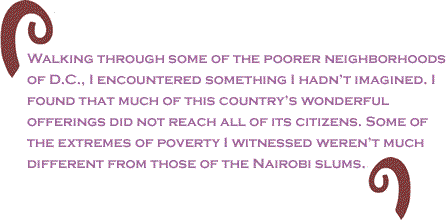| “I
want to live in America.”
I was twelve years old, shelling peas with my mother in our kitchen
in Limuru, Kenya, when I first uttered those words. My mother
paused and said to me, “Well, then you better study hard
and do well in school. The door will only open for those
who knock.”
My mother’s advice was a guiding force for the nine years to follow.
I completed high school with excellent scores, and went
on to receive my B.A. at the University  of
Nairobi. Then in 1994, while working as an organizer in
my community, I received a scholarship from USAID, which
allowed me to build on my local development efforts through
a course in Washington, D.C. of
Nairobi. Then in 1994, while working as an organizer in
my community, I received a scholarship from USAID, which
allowed me to build on my local development efforts through
a course in Washington, D.C.
Finally, I’d made it to the land of opportunity! America was in many
ways true to my imagination: full of kind and generous people
who were curious about life in other places, highly resourced
institutions that worked efficiently, excellent public transportation,
beautiful buildings and fast cars all around me.
But, walking through some of the poorer neighborhoods of D.C., I
encountered something I hadn’t imagined. I found that much
of this country’s wonderful offerings did not reach all
of its citizens. Some of the extremes of poverty I witnessed
weren’t much different from those of the Nairobi slums.
It made me wonder: How could so much need exist in this land
of plenty?
The poorest D.C. residents clearly had very limited access to productive
and meaningful economic opportunities. For some, even the
most basic needs went unmet.
I was often asked how it was possible that I, a young woman from
Kenya, was able to attend graduate school
while so many here are unable to attain even a high school
diploma. Many of those baffled by my circumstances were
African Americans, who didn’t view a college education as
something they could ever reach.
Six months later, I went back home to Kenya, my vision of America
significantly altered by the time I had spent here.
More than a decade has passed since my first trip to the U.S. Today,
I live here with my family, and have made a career out of
understanding the factors that make extreme inequality possible.
If we view economic inequality in the U.S. through a racial lens,
it becomes clear that Black Americans have experienced diminished
progress in recent decades. For example, from 1947 to 1977
Blacks gained five cents to each dollar of median family
income for White workers, but in the three decades since,
they have gained only one cent.
The American reality may have been far from a dream for people of
color in the 1940's, but upward mobility has since become
even more difficult. The stagnation of wages for the lowest
earners, depression-like unemployment rates among people
of color and increased economic segregation have helped
to create racialized pockets of destitution. As a result,
people of color depend far more on unemployment insurance
and other social safety net programs than do Whites.

This is directly attributable to pre-existing wealth disparities
and ongoing economic policies that disproportionately benefit
wealthier Americans.
To make matters worse, conservative politicians at all levels of
government are calling for drastic and poorly informed budget
cuts. Such proposals would be damaging to vital programs
such as education, food safety, environmental protection,
housing assistance, and community services, to name a few,
and would be particularly debilitating to communities of
color.
An austerity plan will exacerbate low and middle income Americans’
struggle to make ends meet, causing demand to fall, the
economy to contract and the jobs crisis to continue unabated.
And, it will only worsen the vast inequalities in our economy.
The American promise certainly beckons, and I am a living testament
to the power of its allure. But, without a bold and progressive
policy approach to address economic inequality, such a promise
will never be fulfilled. Changing this reality will require
each of us to join together in a movement for greater equality
and justice for all.

BlackCommentator.com Guest Commentator Wanjiku K. Mwangi is the Racial Wealth
Divide Leader at United for a Fair Economy in Boston, Massachusetts.
She co-authored the report, State of the Dream 2011: Austerity
for Whom? that's available at faireconomy.org/dream.
Click here to contact Ms. Mwangi.
|

